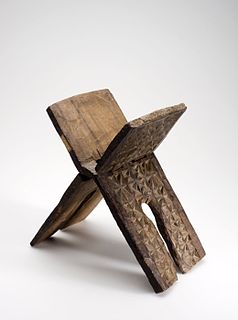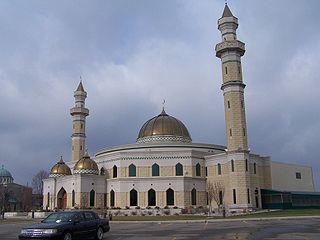
Islam is the third largest religion in the United States, behind Christianity and Judaism. A 2017 study estimated that 3.45 million Muslims were living in the United States, about 1.1 percent of the total U.S. population. In 2017, 20 states which were mostly in the South and Midwest reported Islam being the largest non-Christian religion.

Islam was the first Abrahamic monotheistic religion to arrive in Ghana. Today, it is the second most widely professed religion in the country behind Christianity. Its presence in Ghana dates back to the 10th century. According to the Ghana Statistical Service's Population and Housing census (2021), the population of Muslims in Ghana is about 19.9%.

Islam was the first Abrahamic monotheistic religion to arrive in Ivory Coast. Today, it is the second most widely professed religion in the country behind Christianity, representing 35 to 40 percent of the total population.

Islam is the predominant religion in Senegal. 97 percent of the country's population is estimated to be Muslim. Islam has had a presence in Senegal since the 11th century. Sufi brotherhoods expanded with French colonization, as people turned to religious authority rather than the colonial administration. The main Sufi orders are the Tijaniyyah, the Muridiyyah or Mourides, and to a lesser extent, the pan-Islamic Qadiriyyah and the smaller Layene order. Approximately 1% are Shiites and <1% are Ahmadiyya Muslims.

Islam in Burkina Faso has a long and varied history. According to the 2010 census, the population of the country is 63.2% Muslim.

Islam is a minority religion in Kenya representing 10.9% of the Kenyan population, or approximately 5.2 million people. The Kenyan coast is mostly populated by Muslims. Nairobi has several mosques and a notable Muslim population. The faith was introduced by merchants visiting the Swahili coast, which led to local conversions and foreign Muslims becoming assimilated. This would later result in the emergence of several officially Muslim political entities in the region.

The official religion of Pakistan is Islam, as enshrined by Article 2 of the Constitution, and is practised by approximately 96.47% of the country's population. The remaining less than 4% practice Hinduism, Christianity, Ahmadiyya, Sikhism and other religions. A few aspects of Secularism have also been adopted by Pakistani constitution from British colonial concept. However, religious minorities in Pakistan often face significant discrimination, subject to issues such as violence and the blasphemy laws.

Religion in Nigeria is diverse. Nigeria's constitution ensures freedom of religion and the country is home to some of the world's largest Muslim and Christian populations, simultaneously. Nigeria is divided roughly in half between Muslims, who live mostly in the north, and Christians, who live mostly in the south; indigenous religions, such as those native to the Igbo and Yoruba ethnicities, are in the minority. The Christian share of Nigeria's population is on decline due to lower fertility rate compared to Muslims in the north.

Angola is a predominantly Christian country with Islam being a minority religion. As of 2014 census, there are 195,000 muslims in Angola, representing 1% of total population. Most Muslims in Angola are Sunni. They are generally foreign migrants from West Africa and the Middle East, although a few are local converts. There exist several Islamic organizations that run mosques, schools and community centers. The Association of the Development of Islam in Angola is the primary proselytizing organization. Muslim Angolans are represented by the Supreme Council of Angolan Muslims of Luanda. As of late 2013, the Angolan government does not legally recognize any Muslim organizations; as a result, mosques in the country have faced restrictions and many have been shut down by the government.

Islam is a minority religion within the Democratic Republic of the Congo where the large majority is affiliated to various Christian denominations and sects. It was first introduced to the Congo basin from the East African coast during the Arab slave trade in the 19th century and remains largely concentrated in parts of Eastern Congo, notably in Maniema Province. Most Congolese Muslims are Sunni and follow the Shafi‘i and Maliki school of jurisprudence (fiqh). Though estimates vary, it is generally believed that between one and 10 percent of the country's population identify as Muslim.

Islam is a minority religion in Burundi where approximately 90 percent of the national population are followers of Christianity. Between 2–5 percent of the population identifies as Muslim, according to a 2010 estimate by the United States Department of State. The same year, the Pew Research Centre estimated that there were 230,000 Muslims in Burundi, equivalent to 2.8 percent of Burundi's 8.4 million inhabitants.

Islam in Tanzania is the nation's second largest religion behind Christianity. According to a 2020 estimate by Pew research center, Muslims represent 34.1% of the total population. The faith was introduced by merchants visiting the Swahili coast, as it became connected to a larger maritime trade network dominated by Muslims. This would lead to local conversions and assimilations of foreign Muslims, ultimately causing the eventual formation of several officially Muslim political entities in the region.

The predominant religion in Kenya is Christianity, which is adhered to by an estimated 85.52% of the total population. Islam is the second largest religion in Kenya, practised by 10.91 percent of Kenyans. Other faiths practised in Kenya are Baháʼí, Buddhism, Hinduism and traditional religions.

Christianity is the most widely professed religion in Benin, with 48.5% of the nation's total population being members of various Christian denominations. Consequently, it plays an important role in shaping the country's social and cultural life.

Botswana is a Christian majority nation. However, the country is officially secular and allows freedom of religious practice.

Christianity is the largest religion in Tanzania, representing 63.1% of the total population. There are also substantial Muslim and Animist minorities.
Islam is the most followed religion in Niger and is practiced by 99% of the population. According to Pew, roughly 80% of Muslims are Sunni of Maliki school of jurisprudence, whilst 20% are non-denominational Muslims, Other religions practiced in Niger include Animism and Christianity.
The population of Shias in Africa is composed of several communities:

Adherents of Islam constitute the world's second largest religious group. According to a estimation in 2020, Islam has 1.9 billion adherents, making up about 24.7% of the world population. Most Muslims are either of two denominations: Sunni or Shia. Islam is the majority religion in several subregions: Central Asia, West Asia, North Africa, the Sahel, and the Middle East. The diverse Asia-Pacific region contains the highest number of Muslims in the world, easily surpassing the combined Middle East and North Africa.

A 2009 survey by the Pew Research Center estimated that 10-13% of Muslims worldwide adhere to Shia Islam, with a global total of between 154 million and 200 million Shia Muslims. In the Americas, Pew estimated a population of just under 4.6 million Muslims overall in 2009, with a small portion of those being Shia.













